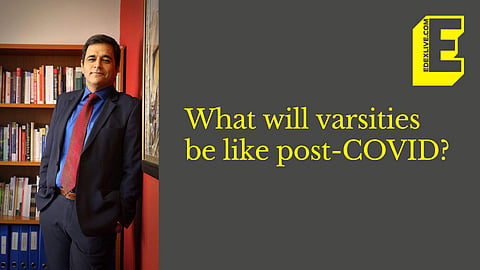

Universities have been closed for over a year now owing to the COVID-19 pandemic. But as COVID recedes across the world, most of these universities across the globe are slowly opening their doors to accept new students. But how will universities look like after a year of online classes? What changes have to be made? Sharad Mehra, Asia Pacific CEO of Global University Systems, which partners with several private universities in Canada, UK, Israel and Europe, answers some pertinent questions about universities in a post-COVID world. Excerpts from an interesting chat:
How would you say universities across the world have adapted as they get ready to welcome back students on campus after so long?
We need to rapidly adapt and transform what already exists. The challenge in today’s time is to be anywhere and be accessible anytime. Therefore online learning has to synchronise with changing pedagogy and curriculum to meet the demands of the industry, equip students with skills and also provide an ambiance of safety and security, in light of the challenges unleashed pandemic.
It’s a fact that higher education institutions have depended heavily on international students to generate revenue and that has taken a hit during COVID-19. But now universities have to explore overseas campus destinations, as an alternative to this. Similarly, they can explore flexible curriculum in collaboration with content providers and MOOCs that provide unlimited choices.
A lot of students choose to defer their admissions by a year in several universities due to the pandemic. Do you think that's wise? Is the campus experience worth the sacrificed year?
Deferring admission is a personal choice and it also depends on factors like safety, virus spread, vaccination and other circumstances, relevant to each geographical location. Life skills have come to the forefront with the pandemic and consequently, this global situation has become a learning process for everyone. As a part of this, students must learn the value of collaborating with their peers, adaptability, agility, flexibility, problem-solving, networking, communication — which are key life skills.
While choosing to defer admission to campus is a personal and individual choice, the teaching and learning model at universities is changing and will certainly transform further. This new model will be hybrid — partially physical and partially online to provide a more enriched and immersive learning experience to the students.
What are some of the trends that you see in universities across the world as we emerge from COVID and what's the road ahead like?
Deeper digital footprints, accessibility, equitable opportunities and new pedagogy are the major changes that will shape the road ahead. Perhaps the most valuable lesson imparted by the pandemic is the value of human life and health. Therefore, in academic spaces and learning, soft skills — agility, adaptability, collaboration, communication, risk-taking abilities — will continue to carve a sharper trajectory alongside technical skills. Therefore courses, curriculum, projects, internships and future careers are set for a significant overhaul starting with higher education institutions.
Coming to Indian students studying abroad, what would you say about the revised assessment scheme announced by the CBSE and ICSE boards? Does it affect them or their admission process in any way?
Since this is a COVID year, there have been multiple challenges for everyone, everywhere. Owing to these COVID-related challenges, there may be several changes like the introduction of a global assessment examination, maybe a new formula wherein weightage may be given to academic and also extra-curricular activities and other checks and balances may be further be added to the system. But again, this is an individual choice that rests with every university.
Coming to India, undoubtedly, the government is concerned about the well-being, safety, health and welfare of the students and prompted by these factors, they have taken this step. I think it’s too early to comment on how it will impact the admission process.
What are you at GUS doing to ensure that your campuses remain safe, welcoming and still embodies that campus vibe?
This year, we have gone a step ahead for providing a holistic campus experience with virtual tours and most importantly more inclusive. Our aim is to ease worries on the monetary aspect of campus learning. We have unveiled a host of ‘COVID Care Scholarships’ aimed at wards of faculty, frontline workers and students whose parents have succumbed to the pandemic. On the ground here’s a list of actions we have undertaken to ensure safety for our students and faculty:
• Our campuses have been certified safe by Bureaus Veritas.
• Besides social distancing, as a precautionary measure, cafeteria services are temporarily restricted. Only packed food is available — sitting and gatherings inside the cafeteria are prohibited.
• A roster system ensures that a limited number of staff and students are present on the campus at any time.
• All our classes are recorded and are available online as well — so that any student can have remote access.
